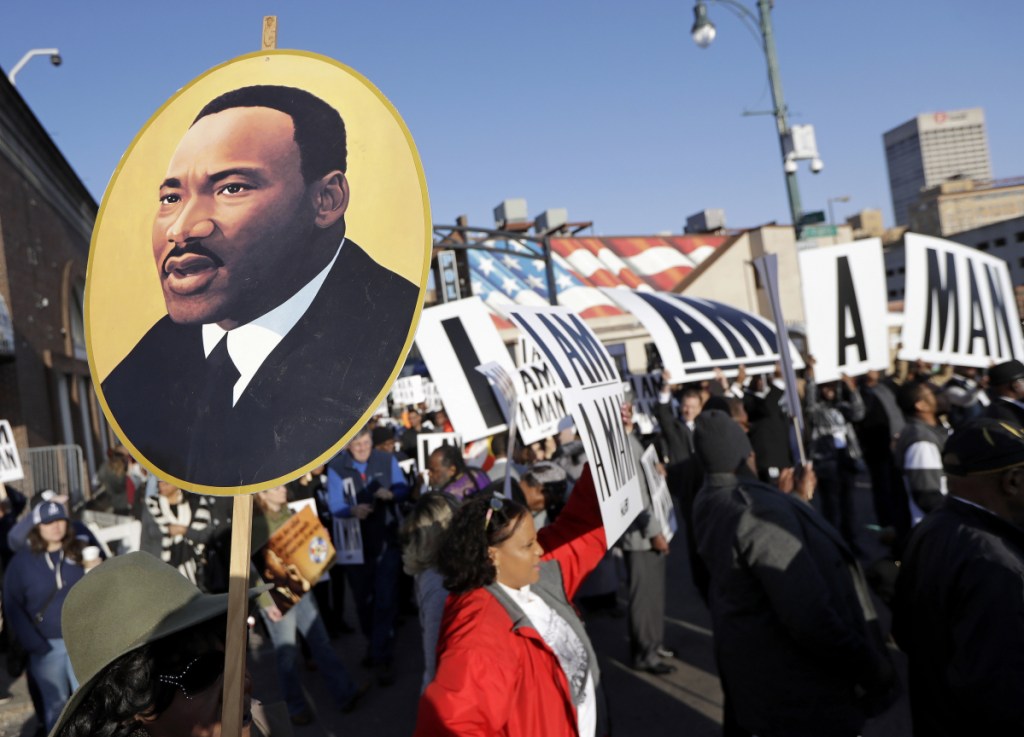In his speech at the 1963 March on Washington, Martin Luther King Jr. famously said that he hoped his four young children would “one day live in a nation where they will not be judged by the color of their skin but by the content of their character.”
Fifty years to the week after his assassination in Memphis, Tennessee, whether you believe that day has come or not depends very much on the color of your skin, which is to say that it has not truly come at all.
When it comes to race in the United States, there are two countries. In one, advancements, even in fits and starts, have led to a color-free society, or at least something close. In the other, the racism hard-wired into America’s institutions has not gone anywhere. And it is the privilege of not having to deal with the latter that makes believing in the former possible.
VERY DIFFERENT VIEWS
Black and white Americans have very different views on how far this country has progressed since King delivered those words in front of the Lincoln Memorial, particularly when it comes to police, the criminal justice system and voting rights, according to an Associated Press poll. Those are the front lines in the fight to achieve King’s vision, and unfortunately the people most responsible for making things right largely don’t see a problem.
That blindness to injustice allows it to exist. In the first study of its kind, researchers from Stanford, Harvard and the Census Bureau used IRS and other data from virtually all Americans in their late 30s to show just how much people are judged by the color of their skin.
The study found that in almost every neighborhood, across all income levels, black Americans, and men in particular, are far less likely to match or exceed their parents’ earnings than whites.
Despite claims through the years, the data show it’s not a matter of cognitive ability, as women of either race are equally upwardly mobile, nor family structure, as the inequities persist regardless of the number of parents in a particular family.
In fact, a black man raised by two parents making around $140,000 a year earns the same in adulthood as a white man raised by a single mother making $60,000.
Even parental wealth can’t buy a black man an easier path; while most white men raised wealthy stay that way, a black man raised in a similar household is more likely to become poor than stay wealthy.
That is institutional racism at work. If it is not one’s home life, nor their parents’ income, nor their natural ability that makes a difference, then it must be something else; there is something about how the economy and society as a whole treat black men that drives the differences in economic achievement. (Black women face the same discrimination, of course, but there is a gender gap in some of the findings that needs further examination.)
It has to do with how black Americans are treated every day. Black Americans are more likely to have trouble buying a home or getting a loan than whites in similar circumstances. The same applies to college admissions.
Younger black students are more likely to be disciplined in school than their white counterparts. The discipline is more likely to be harsh and to lead to involvement with police, as well.
Blacks are more likely to be pulled over, searched, ticketed, arrested and incarcerated, even when controlling for poverty. In fact, a black man raised in a wealthy household is more likely to go to prison than a white man raised in a poor household.
As a result, blacks are incarcerated at eight times the rate of whites, affecting their job and housing prospects, and their ability to parent and to vote.
That’s how people are systemically kept back from participating in the American Dream, and it’s hard to see when you’re not the one being kept back. What the data show are systemic injustices, and as King said in another famous speech, given in Memphis the night before he was shot and killed, “Survival demands that we grapple with them.”
Also on that night five decades ago, King said these words, as relevant now as they were then: “Let us rise up tonight with a greater readiness. Let us stand with a greater determination. And let us move on in these powerful days, these days of challenge to make America what it ought to be.”
Send questions/comments to the editors.



Success. Please wait for the page to reload. If the page does not reload within 5 seconds, please refresh the page.
Enter your email and password to access comments.
Hi, to comment on stories you must . This profile is in addition to your subscription and website login.
Already have a commenting profile? .
Invalid username/password.
Please check your email to confirm and complete your registration.
Only subscribers are eligible to post comments. Please subscribe or login first for digital access. Here’s why.
Use the form below to reset your password. When you've submitted your account email, we will send an email with a reset code.